| |
 |
MECHANICS & COMMUNICATION
The Pre-Game
Andrew Castiglione
Founder of Ken Aston Referee Society
 |
" Knowledge of the fundamentals, trust in your fellow officials, and communication!!! "
We've all done it at one time or another. We arrive at the field to do
middle, maybe we are running a little late - need to start the game on
time. The assistants are experienced, we assume everyone knows their
duties, so we check in the teams, do the coin toss, check the nets, and
start the match.
Fifteen minutes into the half, there is a scramble in front of the net,
the keeper comes up with the ball, the attackers and defenders are all
looking at the referee, waiting for a call. Our lead assistant is moving
back towards midfield. What happened? Do we allow the keeper to play the
ball out? Did the ball pass over the goal line and under the bar before
the keeper took possession of it? Is that why the AR moved out? Or, is
the AR just positioning himself to cover the second last defender for
the keeper's play?
The point is, we don't know what happened, but something clearly
did and, now, our only choice is to stop play and go over to
the assistant to find out what happened. Was it a goal (KO)? Was there
an offense in the PA, by who, a defender or attacker (PK or DFK)? Was it
a good save (no goal, dropped ball)?
No matter what we do now, the flow of the game has been broken, and
worse, the referee crew looks silly. This could easily have been
prevented had we taken a few minutes before the start to conduct a
pre-game with our assistants.
At the professional levels the referee crew will spend an hour or more
doing their pre-game; covering every possible situation they might
encounter during the match. At the youth and amateur levels, you may
only need five minutes for your pre-game, but regardless of the level of
play, the pre-game is a procedure every referee must adhere to.
So what do we cover in a pre-game?
Following is a summary of the key points covered in a 5 minute pre-game
sheet, contributed by Dave Resley - AYSO National 1 Referee &
Instructor, Ken Aston Referee Society. While many of the basic mechanics
are covered in the Guide to Procedures for Referees, Assistants and
Fourth Officials Download & Print it, this provides a format for the
referee to specify those duties and methods of communication he/she
expects from the crew.
EYE-CONTACT:
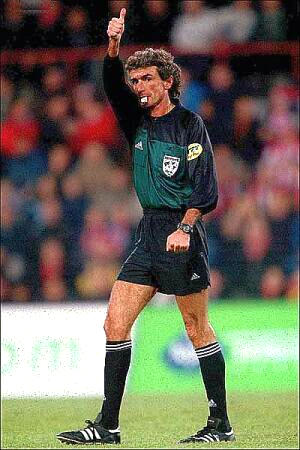
The most important one: Make eye contact with each other at every
stoppage of play - certainly with the assistant in your end - when the
ball goes out of play in their half. Always mention this in your
pre-game so everyone is on the same page, and knows what to expect. Get
into the habit of giving each other a nod of the head, or a discrete
thumbs-up. Then everyone feels more confident - no one is alone out
there, and everyone is covering each other.
OFFSIDE:
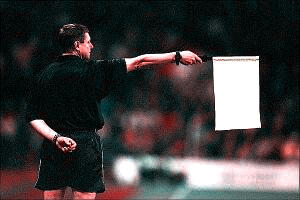
Give a reminder that is the most important aspect of the job. Stress
that raising the flag indicates offside position AND involvement -
in
other words, the AR thinks it should be penalized. Suggest delaying the
flag if uncertain. The referee then has the responsibility to take a
"second-look" in case of a late flag. After the referee blows for the
free kick, the AR drops flag to a position to indicate section of field.
Remind them that if you miss their flag to keep it up until the ball
goes out of play or clearly into the possession of the defenders.
GOOD GOAL:
Cover the mechanic for good goal - If a goal appears to have been
scored, PAUSE - no hurry - no one will be looking at the officials. It
is best to get it right with a second or two delay, than hurry and have
a serious incident. It is an emotional time: 1) Referee will look to the
AR (stay calm); 2) Eye-contact is made; 3) If all is in order, the AR
will sprint towards the halfway line; 4) The referee will then point to
the center circle and backpedal toward the halfway line (No whistle,
please!) to indicate the goal and restart.
You should also cover what to do in situation where the ball goes
quickly over goal line for a goal, and then back out again. The mechanic
is: 1) AR raises flag (ball over goal line); 2) AR makes eye-contact
with ref; 3) Referee blows whistle to stop play then; 4) AR sprints
towards halfway. In any case when a goal is scored, all officials
observe players for nonsense involving scorers/defenders etc.
"BAD" GOAL:
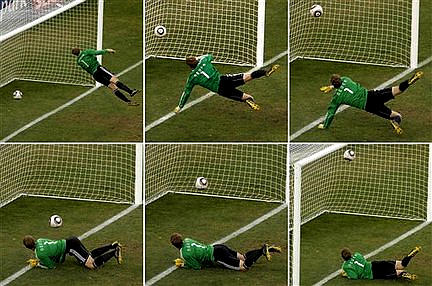
Sunday, June 27, 2010 file combination of six photos shows Germany goalkeeper
Manuel Neuer looking at the ball that hit the bar,
bounce over the line during the World Cup round of 16 soccer match between Germany and
England at Free State Stadium in Bloemfontein, South Africa. The goal
was disallowed by the game's referee.
After blown calls at vital moments
of vital games, before a worldwide audience at the World Cup,
the guardians of international soccer are being pressed harder than ever to
explain resistance to video replay and their embrace of human error.
If the referee disallows, easy. If the AR believes the goal should be
disallowed, there are two key mechanics: 1) If the goal scorer was
offside, the AR stands with flag signal for an offside infraction - flag
straight up in the air. 2) If any other attacker was offside, or there
was some other infringement by an attacker, which could nullify the
goal, the AR stands at attention with NO FLAG signal. The referee must
make the decision. A conference at that time is discouraged (only as a
last resort). It is better to work out some subtle indicators ahead of
time like a closed fist, a shrug. At any rate the referee must make the
final decision.
FREE-KICKS:
How much help is the referee looking for in calling free kicks? Does
that extend into the penalty-area (PK) or not? What does the referee
want the AR to do if a foul is called for the attacking team and the ref
does not know whether it was outside the penalty-area (free-kick) or
inside (PK)? How does AR communicate the correct info to the ref? Then,
if it's a free kick, what position does the ref want the AR to take:
Stay with offside, or go to the goal line? Will the ref always want the
same thing, or will he vary depending on position, distance etc? What
will his signal be to the AR?
PENALTY-KICK
What does the referee want from the AR? To watch keeper movement? Goal
Line? Nothing?
BEHIND THE BACK STUFF:
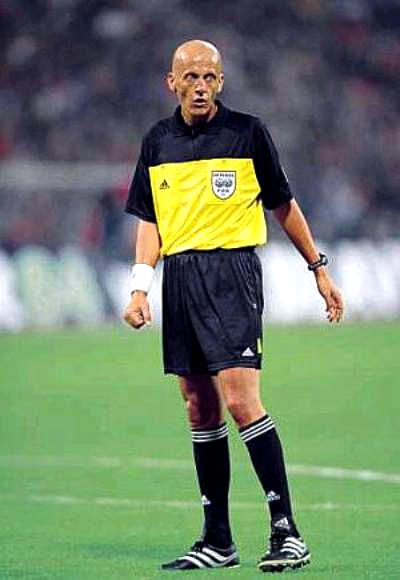
What does the ref expect from his ARs regarding stuff that happens that
he can't see? The AR must be involved. The players expect one type of
game to be called, so consistency is required. For example, if the
referee is allowing incidental contact, then the AR should ignore
similar contact out of the referee's view. How involved does he want his
ARs to get? How does he want the information communicated? How much OR
how little information does he want? Does he/she want the AR to inform
him or her of misconduct? The referee would then decide if the act
merits the issuance of a card.
RECORD/TIME KEEPING:
What does the ref want the AR to keep a record of? Time? Cautions? Subs?
Nothing? Even if the referee delegates some duties, the referee is still
responsible for making an accurate reporting. Assessors, assignors and
league authorities hold the referee accountable.
WAVE-DOWN/EAT THE FLAG:
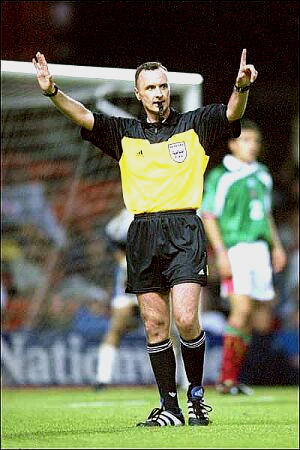
The referee should say that, from time-to-time, he might have to ask the
AR to put the flag down - to "eat it". He should stress that he does not
wish to offend the AR, and it may be that the AR has done nothing wrong,
but at certain times he may feel the need to allow play to continue, and
ignore the flag. He should ask the AR to accept that decision, and to
get back to the game without feeling offended. And he should then
discuss these incidents at the end of the half so everyone learns the
reason he did it - maybe the ref was wrong, but he has to retain the
right to "wave down".
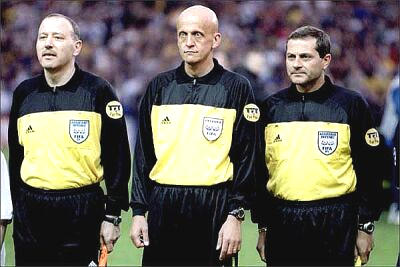
Finally, stress that the crew has to
function as a... Team.
The keys to successful teamwork are knowledge of the
fundamentals;
The Documents:
|